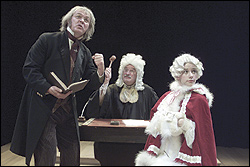Taproot Theatre usually can be counted on for solid, swift, quietly winning productions of middlebrow entertainment—moderately challenging but broadly appealing and easy on the eyes, ears, and minds of its faithful, well-heeled patrons. What the company may lack in experimental daring, it more than makes up for with competence and tastefulness. In the world of theater, to be consistently above average is no small achievement, and Taproot’s steady-as-she-goes approach makes it the perfect pinch hitter during down times—the sort of company you can rely on when you’re sick to death of salesmen and Danes, but don’t particularly feel like perching in the shaky front tier of the avant-garde. This isn’t to say Taproot is an exemplar of mediocrity; it has enough talent and verve to keep it from merely not sucking. The fringe will always be with us. In the meantime, there’s Taproot.
It’s perfectly in keeping with its approach that Taproot has entered the holiday sweepstakes with a new/old work of reconstructed nostalgia. The Trial of Ebenezer Scrooge (through Friday, Dec. 30; 206-781-9707, www.taproottheatre.org) is the type of fresh-but-familiar show that Taproot often does well, but it’s not, unfortunately, the theater’s best work.
Written by Mark Brown (Around the World in 80 Days, The Little Prince) and directed by Taproot co-founder Scott Nolte, Trial is a satirical goof on the Dickens classic. It’s a sequel of sorts, though in its various elements and sentiments, if not exactly in tone and execution, what you’ve got is A Christmas Carol as courtroom drama. One year to the day after the heartless accountant’s transformation, Scrooge has decided to file suit against his dead partner, Jacob Marley, as well as all those meddling Christmas ghosts—with charges including, but not limited to, attempted murder, breaking and entering, and the infliction of emotional distress. Obviously, the cure didn’t take; it never does. Ebenezer’s opening remarks are terse: “Bah, humbug!”
Scrooge is played by Taproot veteran Nolan Palmer, recently seen as Uther in the Arthur trilogy. With his coarse gray hair, grizzled chin whiskers, and smoldering eyes, Palmer looks like Neil Young but sounds like Tom Waits, all grunts and gravelly barks. You can almost smell the mothballs in his clothes. Defending the charges is lawyer Solomon Rothschild (the excellent Kevin Brady), a smooth talker who can flip the charm switch at will. The rest of the players should be well known, including Bob Cratchit (Bill Higham, who also plays Marley), Scrooge’s nephew Fred and Christmas Future (both played by Sam Wilson), and Mrs. Cratchit and Sara Wainwright (Sabrina Prada). Steve Manning is suitably grouchy as the red-faced Judge; Larry Albert is the fruity Bailiff. Lindsay Christianson is fantastic as the flirty, flighty Ghost of Christmas Past. Dickens’ immortal font of adolescent pathos, Tiny Tim, conspicuously and inexplicably absent, is represented symbolically as a gnarled cane. Perhaps playwright Brown felt he would have only gotten in the way.
Often quite clever and funny, The Trial of Ebenezer Scrooge goes down like hot buttered rum—if you like hot buttered rum. The conceit of a Scrooge lawsuit is juicy fodder for an SNL-style skit; stretched the length of a play, however, it ends up a bit thin, leeching too much off the original and never quite able to establish its own worth. There’s no arc. Though inevitable, Scrooge’s second transformation—his reawakening to the Christmas spirit—feels tacked on. In the original, Dickens created legitimate emotional agony by slowly ratcheting up the toll of Scrooge’s scroogeness until the sad old man’s piecemeal remorse bursts out in a contagious flare of generosity. Granted, Trial is a spoof, but it still wants that epiphany along with the yuks. It just doesn’t earn it. It’s pleasant enough, but it’s got no lift, no swell. In a season whose main currency is nostalgia, Trial comes up short.








